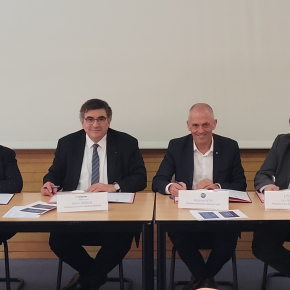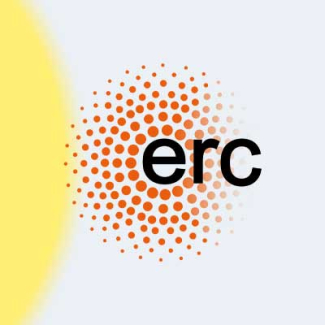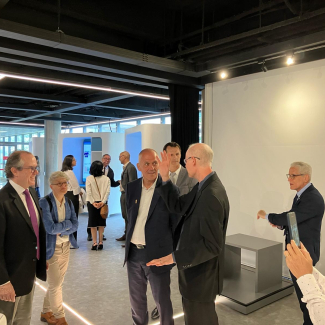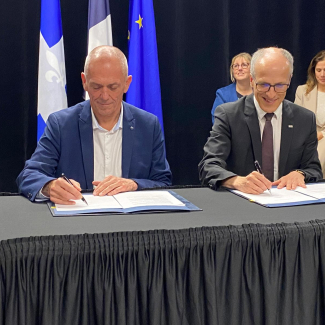
European projects: the CNRS joins forces with its partners in Marseille
On February 16th 2024, the Mission Europe pour la Recherche (European Mission for Research) was inaugurated in Marseille. This is a 'one-stop shop' for researchers wishing to apply for European research and innovation funding. It results from a joint initiative involving Aix-Marseille University, the CNRS, the Inserm and the IRD and could inspire other similar project experiments.
An original event took place on the Canebière this Friday February 16th when number 63 on Marseille's most emblematic street hosted representatives from Aix-Marseille University (AMU), the CNRS, the Inserm and the IRD for the inauguration of a whole new kind of structure – the Mission Europe pour la Recherche (MER). This event was the culmination of a project launched three years ago in the framework of the A*MIDEX initiative of excellence1 . The four aforementioned institutions are part of this initiative alongside other establishments2 . Aurélie Philippe, the regional officer for the CNRS in Provence and Corsica, stresses the quality of relations between the members of A*MIDEX: "A*MIDEX has instilled a true climate of trust and shared objectives around the laboratories (French link). This has meant our organisations could adopt a very fluid working relationship at institutional and operational levels alike with our respective teams thus working together almost daily". The 'ERC Club', more commonly known as the 'CERCle', was created in 2017 in the framework of this initiative. The aim of this collaboration between the A*MIDEX organisations was to increase the success rate of scientists in the ERC programme. This on a site that was already the leading recipient of grants from the European Horizon 2020 research framework programme (2014 – 2020) in the Provence-Alpes-Côte-d'Azur region. Aurélie Philippe's assessment of the whole adventure is very upbeat: "Between 2017 and 2020, we observed a knock-on effect from the creation of the CERCle. We have in fact almost doubled our success rate in European projects".
Towards a one-stop shop for European funding applications
The MER's ambition is now to move beyond the CERCle. Céline Damon compares the CERCle to "the Europe of nations working together towards shared goals while the MER is more like a federal Europe with a high degree of integration between all the institutions". Despite this high degree of integration, the specific features and requirements of each organisation have of course been retained in a classic type of balancing act established between the partners in the Marseille area. The CNRS regional officer sums this up by pointing out that "we have to move towards simplification and pooling while maintaining each institution's visibility".
Taking this factor into account, the four institutions reacted to the success of the CERCle in 2021 by agreeing to pool their respective Europe units in a 'one-stop shop' accessible to any scientist belonging to the institutions, regardless of their employers. This one-stop shop is the MER which has two defined objectives. The first is to simplify the administrative process (French link) for scientists applying for European funding. The second is to pool the four partners' teams and recruit new staff with wide-ranging profiles to increase and diversify the range of services provided for the scientific community. The head of the MER sees this shared unit as "more than just the sum of the four institutions' strengths. We have additional resources and staff from different backgrounds which means we can offer a tailor-made service to each scientist". This kind of individualised service reflects the conclusions of a study by the teams involved when the H2020 programme came to a close. This study found that ten research units alone received over half of all the European grants while around half the laboratories received no funding at all. The focus on ERC projects and successes in this framework also tended to come at the expense of collaborative projects. These only received 30% of the European grants obtained despite nearly three quarters of the total H2020 budget going to such projects.
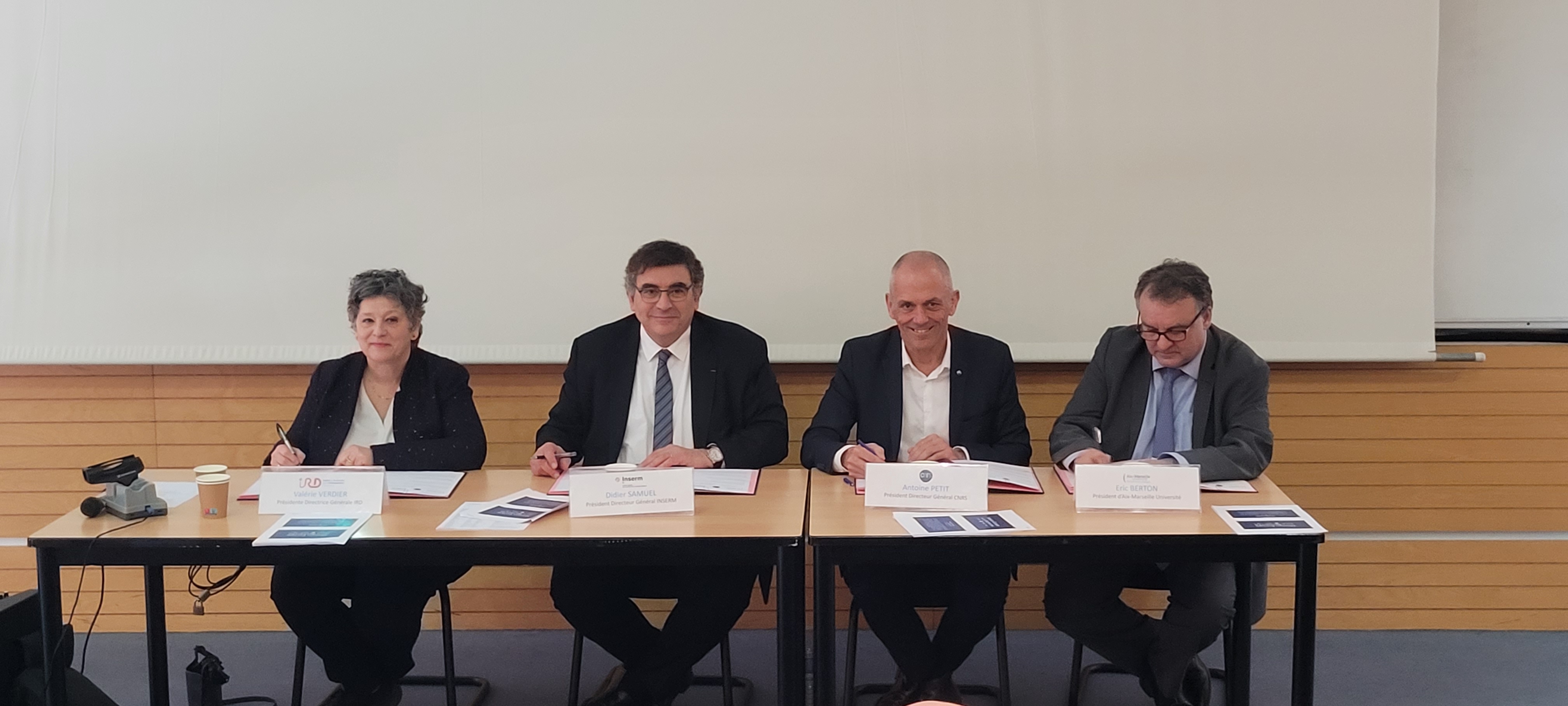
A shared unit jointly created by its staff
The staff members of the four Europe units from the partner institutions can draw on their collective experience and know-how of working on European projects. They were backed by their respective management teams in designing the best possible shared unit to serve research and scientists. Indeed, the fact that the MER was jointly created by its staff members is one of its unique features along with the initial strategic co-construction by their host institutions. Céline Damon used to run the CERCle and, along with the teams involved, still marvels at the high level of commitment shown by the project's staff she now manages – "It was the teams who constructed the core operational support. MER would never have seen the light of day without its staff". The MER's head considers that the project has won over the staff members because it supports their work ethic by facilitating the service they provide to scientists and also because it gives them "an opportunity to develop their skills and evolve in their jobs". The opportunity existing staff were given to position themselves within the MER's 'Detection' or 'Engineering' hubs according their skills testifies to this idea.
The resulting system is much more complex than it first appears. A degree of apparent simplification was designed to make access to this 'one-stop shop' as user-friendly as possible for scientists. Staff members from the AMU (or its subsidiary Protisvalor3 ), the CNRS, the Inserm or the IRD incorporated their home establishments' tools and processes so they can provide effective responses for any researchers, regardless of their institutional affiliation.
The MER is still in its early stages but its head already considers it to be an "emblematic project that will serve as an experiment for other sites". It has already inspired other pooling initiatives between A*MIDEX partners in the Marseille area. For example Aurélie Philippe reveals that the regional office has already "started working on coordinating the University Innovation Cluster (French link) and developing a network of CNRS transfer engineers (French link) with the AMU's business developers". In this way, the MER has provided the academic community's first response to the recommendations set out in the Gillet report submitted to the Minister for Higher Education and Research in June 2023. This report recommended the simplification of administrative procedures and enhanced coordination between universities and research organisations. Let's hope the influence of this metaphorical pebble skimming across the blue Marseille sea will soon be rippling much further afield.
- 1The 'Initiatives of Excellence' were launched in 2010 in the framework of France's Investments for the Future Programme. The winning initiatives were selected by an international jury following a call for projects. These projects bring together higher education and research organisations from different regions of France and aim to position themselves as world-class multidisciplinary universities with top level scientific strengths.
- 2It also includes the CEA, the École Centrale de Marseille, the Institut d'Études Politiques in Aix-en-Provence and Assistance Publique des Hôpitaux de Marseille.
- 3Protisvalor is Aix-Marseille University's subsidiary specialising in supporting researchers in preparing, setting up and managing partnership and European research contracts.
The CNRS action plan for Europe
The CNRS is of course delighted to have been the leading beneficiary of the European framework programmes since their inception but there is still a great deal of room for improvement. This requires raising the awareness of research teams as to the scientific benefits of coordinating or taking part in a European research project and also providing support for researchers setting up and submitting projects to the Horizon Europe framework programme. This is why the CNRS's European and International Affairs Department (DEI) rolled out an action plan for Europe in 2021 and notably recruited many European project engineers to support its teams throughout France, including five at the Aix-Marseille site.
"The CNRS policy of encouraging and supporting those submitting projects will be even more effective if it's implemented in close collaboration with its local academic partners", explains Etienne Snoeck, head of the DEI's Europe Unit. This approach underpins the DEI's support for the MER from the outset which extends to pooling permanent and contract CNRS staff members. "The MER is a pilot project that the CNRS will continue to support and which the organisation hopes will inspire similar initiatives on many other French sites that the CNRS will also accompany", he points out.
